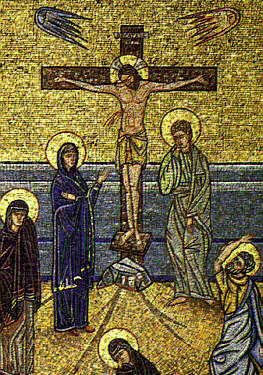The Passion and
Resurrection of the Lord Jesus Christ, Pascha
1997
By the grace of God Archbishop of Australia
To all the Clergy and devout faithful of our Greek Orthodox
Archdiocese
 Brother
Concelebrants and beloved children in the Risen Christ,
Brother
Concelebrants and beloved children in the Risen Christ,
In chanting this year once again the hymn of Holy Easter with the contrition befitting the faithful, we have left for a little while our dull daily routine and every low-minded ambition, as we confess our mystical identification with the Passion and Resurrection of the Lord:
"Yesterday I was buried with You, O Christ, Today I rise with Your Resurrection I was crucified with You yesterday May you glorify me with You, O Saviour In Your Kingdom".
Therefore, the Cross and the Resurrection, death and life, are the two outer limits, between which the personal adventure of each faithful person is unfolded, but they are also the historical course of all the people of God.
Both of these great outer limits are by definition deeply connected and internally bound together, but in the final analysis they remain completely in- compatible within the same moment in time.
Precisely in this lies the uncertainty and anxiety of human life in this world. Yet, at the same time, herein also lies our eschatological hope, already based on what is given and operating in the present world.
However, in order to see the two aspects of worldliness, we must be able to make the distinction and recognise the difference between yesterday and today. Yesterday is the time which does not return. The time which has sealed the pain of the crucifixion. This is why it can expect, almost dialectically, the resurrection in the next phase. Today is the time which is continuously opened to the good will of the Risen Lord. Precisely because the crucifixion has been endured.
We can then say that the sorrow and pain of the crucifixion are the "scars" of the past, whereas the immediacy of the present is sanctified by the guarantee of the Resurrection.
It is not permissible, however, for thoughts to lead to false conclusions. In other words, we should not believe that a moment in time is of itself either good or bad. For the Christian, there is no such thing as a "bad hour". For, all time is of God. And it has been placed at our disposal to serve only as a tool. Thus, according to the Christian understanding, time is neutral. Neither good nor bad. It is coloured and differentiated only by that which "happens" and is "realised" in time.
For the ancient people, by contrast time was the mythical god Cronos who gave birth to and ate his own children. The concept of time was therefor circular in the ancient world. A cycle of blind repetition of the same things. Birth and decay. A cruel destiny. The tedious "treadmill" of death. For us Christians, however, time has a linear meaning. It develops in a line which continuously moves from sin to repentance. From death to Resurrection.
If death definitely belongs to yesterday, it is not of course yesterday's fault, as neutral time. We, as a people of Tradition and Testament, do not forget that yesterday is also the root of our existence, the root of Jesse, which blossomed on earth so as to rise to Heaven. Therefore if death definitely belongs to yesterday, this is only because it pertains to a case of the past. To the "once and for all" character of the Cross, which secured and perpetuates the Resurrection. This is a victory which is "won" once by the only sinless One, the incarnate Son of God. A victory which we are invited to recognise, to know intimately and to share with Him. Christ taught us that life is redeemed only with death, and so the only true victory is sacrifice.
With these measures, and with this new "Logic" established by the incarnate Lord with His Cross and Resurrection, we could solve all of our problems and all of our anxieties once and for all-psychological, economical, sociopolitical and metaphysical- if only we accept the divinely given lesson. Only then will we be able to exclaim with St John Chrysostomos:
"Let no one lament poverty for the common kingdom has been revealed".
To Him Who suffered and rose from the dead for us be glory and worship to the ages of ages.
Amen!
Archbishop STYLIANOS
Primate of the Greek Orthodox Church in
Australia